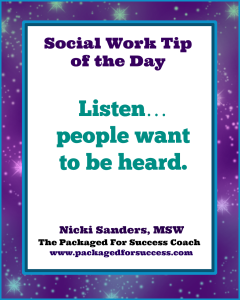by Sharon L. Young, Ph.D., LCSW
Editor’s Note: Within the context of this article, the terms intern and internship refer to the social work field placement or practicum.
A year ago last fall, I began my academic career as the field coordinator at a medium-sized BSW program in Connecticut. Looking back over my first year, it was not unlike what a new intern experiences when beginning the semester at a new placement. The early days were both exciting and terrifying. There was so much to learn and process as I adjusted to my new role. I relied on the expertise of my new colleagues to teach me the ropes and to support me when I struggled. I found a mentor who provided me with guidance and a sounding board when I needed one.
Like a social work intern, I learned on the job by applying the education and experience I brought with me. As you begin your fieldwork, you will learn how to apply your experiences to your new role as social work intern. This article will provide you with some tips and insider information that can make your transition to your internship smoother.
Social work is a demanding profession. As social workers, we understand and respond to a myriad of political, social, interpersonal, and intrapersonal forces that affect the people we serve. Social workers assume a broad range of roles and duties that span wider than those of other human service providers.
As a profession, we are the Jack (and Jill) of all trades. In just one position at a neighborhood agency, I have been a community organizer, a group worker, a clinician, a grant writer, and a program manager. Among my varied tasks, I have driven clients to the hospital, gone camping with a youth group, organized a task force of mental health care providers, and provided crisis support for grieving teens. I know my experience is not unique, in that all social workers will face a wide range of challenges, big and small. My job as a social work educator is to prepare students for the many roles they will play as professionals.
I am no expert on field education. Drawing from my experiences as a student, social worker, field instructor, field liaison, and now coordinator, I have been able to see all sides of the field education experience. I learned many valuable lessons, and I want to share them with you.
1. It’s normal to be nervous and unsure in the beginning.
For some students, the first field placement is their initial step into a professional world. Even for seasoned students, each workplace brings a new set of challenges and expectations. There is a lot to learn in the beginning. Take your time and ask questions. No one expects you to know the job before you start.
2. Always begin with a learner’s stance.
Learning involves watching, listening, asking questions, rehearsing, and practicing. You will find that there will be several people at your field placement who are happy to share their knowledge with you. You will likely learn as much from the clients or consumers as you do from the staff. Allow everyone the opportunity to share their expertise with you.
3. Practice, practice, practice.
Your internship not only provides you with exposure to the field of social work, but also allows you to try out your new skills. If you learned an engagement technique in your practice class, put it to use when meeting a new client. How about applying your knowledge about adolescent development when working with a parent group?
4. Beware of field placement envy.
When you are sitting in seminar listening to your classmate describe a fantastic field experience, don’t despair about your own. Many placements start out bumpy, but they often improve as you become more skilled and empowered to take on more challenging work.
5. If you think your field instructor isn’t providing you with challenging assignments, discuss it with him or her.
Field instructors sometimes like to start students out slowly, so they can be sure the intern is prepared for what is to come. It is helpful to go over your learning agreement with your field instructor throughout the semester, to make sure your agency assignments match your learning goals.
Read the entire list in The New Social Worker magazine.
